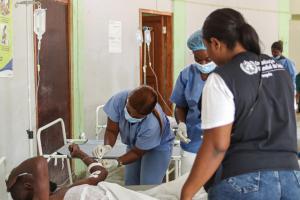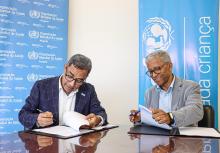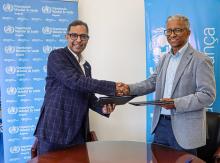WHO and UNICEF sign agreement to fight cholera outbreak in Angola
In a decisive effort to contain the spread of the cholera outbreak in Angola, the World Health Organization (WHO) and the United Nations Children’s Fund (UNICEF) signed a Memorandum of Understanding in Luanda today marking the formal launch of a joint initiative to support the Government of Angola in the emergency response aimed at saving lives and halting the spread of cholera.
The agreement, signed by the representatives in Angola of both organizations, underlines the unified commitment to implement the project entitled “Stopping the spread: accelerating life-saving interventions against cholera in Angola”, which includes crucial interventions in the fields of health, water, sanitation, and hygiene (WASH), and which has the financial support of the European Union, to the value of 1 million euros.
The joint initiative aims to reduce cholera-related mortality by 75% in the most affected provinces over the next four months, through emergency actions targeting more than 500,000 people across the country, with a special focus on children, the elderly, and people with disabilities.
Angola is currently facing one of the most serious cholera outbreaks in decades. As of May 21, more than 21,000 cases and almost 700 deaths have been recorded in 18 of the country’s 21 provinces. The mortality rate is 3.7%, exceeding the WHO emergency threshold of 1%.
At the signing ceremony, the WHO Representative in Angola, Dr. Indrajit Hazarika, stressed the urgency of the response: “This outbreak presents a significant public health concern. Our partnership with UNICEF and the Government of Angola is key to ensuring life-saving interventions reach those most in need, especially deprived and high-risk communities. We are grateful for ECHO’s support, which reflects the value of international cooperation and solidarity in safeguarding health and well-being.”
The collaboration of WHO and UNICEF with national and provincial authorities has been fundamental to the response to the cholera outbreak since the beginning of the outbreak in January, by strengthening the capacities of health professionals, distributing water treatment solutions, implementing basic sanitation measures, mobilizing, and engaging communities, and carrying out vaccination campaigns.
Antero de Pina, the UNICEF Representative in Angola, added: “This agreement and the funding from the European Union reflect our shared commitment to protecting the most vulnerable, particularly children. By combining our strengths in key areas such as health, water supply, and sanitation, we aim to reduce preventable deaths and build resilience in communities.”
The joint action plan includes initiatives such as: a) Establishing oral rehydration points and cholera treatment centers; b) Training health professionals and community volunteers; c) Expanding the water chlorination process and hygiene promotion in affected areas; d) Strengthening disease surveillance and diagnosis capacity; e) Supporting the implementation of a reactive cholera vaccination campaign; and f) Engaging communities, with volunteers facilitating dialogues on protective behaviors and distributing cholera prevention kits to families.
The agreement that has been signed is in line with Angola’s National Cholera Prevention and Control Plan and appears to be a crucial investment in the country’s future health security.


